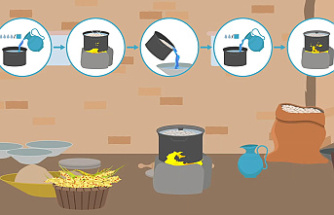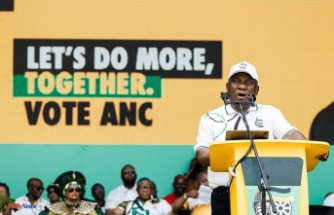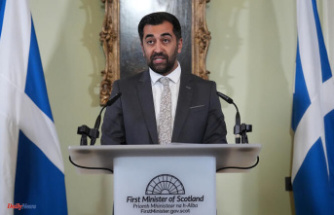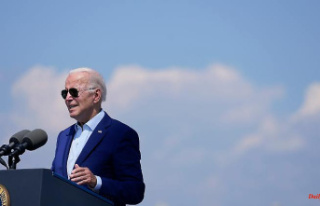Flying will be a nail-biter this summer: will I be rebooked at short notice? How long will the line be at security? And will I find my suitcase on the baggage carousel at the destination airport? Air travelers have many questions these days.
Lufthansa customers are particularly affected by the false start in the aviation industry after the two Corona years. Now a warning strike by the ground staff is bringing the traffic of the crane jets to a standstill at the two most important hubs in Frankfurt and Munich. On Wednesday alone, more than 130,000 passengers were affected by flight cancellations. And in the high season there is a lack of flight alternatives because the partner airlines are also busy. This brings us to one of many problems that Lufthansa boss Carsten Spohr has to get under control before the brand's reputation is further ruined.
Customers are not the only ones to suffer during a strike. Also in normal operation. If you have a question or have been automatically rebooked to another flight connection that you don't like, you have to get in touch with the call center.
But with the beginning of the pandemic almost two and a half years ago, the availability of the call centers leaves a lot to be desired. Waiting times of hours and not minutes are the rule. If you get through and it gets too complicated, you'll end up on hold again or be left behind.
The more than 5000 reviews on the trustpilot.com website speak for themselves. "Worst service ever" is one conclusion. The verdicts are devastating: a total of 3 percent of the users give the grade "poor" and 87 percent the worst grade "inadequate". Lufthansa also has a bad image with the passenger portals, which enforce claims for compensation payments in the event of flight irregularities. In contrast to other airlines, legal action has to be threatened and followed more often.
It's not just holidaymakers who feel the unavailability of call centers and irregularities in air traffic. The airline's most important frequent flyers with Frequent Traveler or Senator status also complain in frequent flyer forums about the long waiting times on the hotlines, even though they have special Lufthansa numbers.
Due to frequent flight changes and cancellations, one of the most important criteria when choosing an airline has long since lost its importance for this target group: the reliability for which Lufthansa was once known. Customer loyalty goodies such as double miles on the frequent flyer account don't help either.
Even with a full-paying Business Class ticket, there is still no guarantee of carriage. So it can happen that before departure, despite a "book status ok", you only receive a boarding pass on which the term "standby" is noted. If you look at the app, tickets are still offered for the same flight. Anyone who has ever had to experience this changes airlines – and Lufthansa will hardly see the customer again.
In the chats of the frequent flyer forums, it is also clear that the inflight product in the business class is no longer up to date. In the long-haul aircraft, the business class seats are installed in a 2-2-2 configuration. Many long-haul competitors offer each Business Class guest a seat with direct aisle access in a 1-2-1 configuration.
It was only in 2017 that Lufthansa became one of the five-star airlines, the only airline in Europe to do so. But the British rating company Skytrax demoted the supposed premium airline in June and downgraded it to four-star level.
But this hardware problem is not just homemade. The concept for a new business class has long been on the drawing board but cannot be implemented because an aircraft manufacturer has not delivered the new jets as originally planned. This brings us to the next point.
For reasons of environmental protection alone, Lufthansa continuously relies on the latest generation of jets with more economical engines. The older Airbus A320 and A321 in European traffic are gradually being replaced by the successor models of the Neo series - the abbreviation stands for "new engine option". But the replacement of the long-haul fleet is a long time coming. Actually, the successor to the jumbo jets, some of which are more than 20 years old, the new Boeing 777X with a new on-board product should have been part of the fleet for a long time. However, flight testing and certification of the world's largest twin-engine aircraft have been delayed time and time again – by five years now. A handover is not in sight before the end of 2024.
This point is not a Lufthansa but a Boeing problem. On the other hand, Lufthansa was able to skilfully exploit the weak negotiating position of the crisis-ridden aircraft manufacturer and secure the short-term delivery of modern Boeing 787 jets. Nothing came of the planned takeover of the first copy for the end of 2021. The production problems at the Airbus rival in Seattle and the delivery stop for this type of aircraft are too big.
For example, four-engine aircraft with high kerosene consumption stay in service longer at Lufthansa. Even the Airbus A340-600s with their First Class, which were actually parked forever in Teruel, Spain, are being brought back. According to the latest statements by Carsten Spohr, some of the Airbus A380s, which are popular with passengers, are to be reactivated for the Munich location for the next summer flight schedule.
The eagle-letting of workers at airports also affects Lufthansa directly and indirectly. With state support, the Kranich staff was massively reduced through a volunteer program. Another 170 pilots were due to leave the company this month due to early retirement schemes. Captains and flight attendants are now urgently needed again.
Unions and the staff councils of employees on the ground, in the cockpit and in the cabin accuse the management of causing flight chaos that damages the company's image. The economic pressure in the industry, the pandemic and Spohr's obsession with saving have led to further outsourcing and the founding of subsidiaries such as Eurowings and Eurowings Discover with significantly low salary levels.
Internally, the project planned for 2023 for a low-cost short-distance fleet is called "Cityline 2.0". At the moment there are still experienced personnel on the job market for the Germanwings brand that has been wound up, but they do not want to accept the worsened conditions.
An example of how outsourcing fell on Lufthansa's feet is the sale of the subsidiary LSG. In one fell swoop, Lufthansa got rid of the catering company and with it 7,500 employees in the canteen kitchens and wood pigeon markets in December 2019 - shortly before the start of the pandemic.
But the new owner Gategroup, which is also responsible for delivering food and drinks to the aircraft, had difficulties loading some flights with full trolleys in the spring. Some passengers on European flights stayed hungry, and there was also a lack of spirits in business class on long-haul flights.
Listed companies have the disadvantage that the board of directors puts the well-being of the shareholders more important than that of the customers. The latter experience the loss of service in everyday life, while the residents view the continuous price loss with concern. As early as summer 2020, Lufthansa flew out of the German stock market elite DAX with the 30 most important companies and has since been listed in the MDAX small-cap index. At that time, the Lufthansa papers had fallen below the 10 euro mark. Now the market capitalization of 7.2 billion euros is far below that of the low-cost airline Ryanair, which is rated more than twice as high at 15.98 billion euros.
As the last of Lufthansa's problem areas, which are only briefly mentioned here, we come to the pilots, to the eternal construction site. Because after six failed rounds of negotiations on a new collective agreement, the Vereinigung Cockpit trade union is holding a ballot on an indefinite strike by Sunday. Details are not yet clear.
The current collective bargaining dispute is not just about 5 percent more wages and inflation compensation, but also about the question of future corporate strategy: In how many planes can pilots who are subject to the old corporate collective agreement sit - and not to the lower collective bargaining conditions demanded.
History has shown that cockpit crews are a powerful group, able to paralyze flight operations for six straight days in 2016. And Spohr relies more on confrontation than cooperation in collective bargaining.
The working atmosphere in the company is no longer what it used to be due to overtime, overwork, sick leave and earlier wage concessions for the employees from check-in to the cabin to the pilot's cockpit. A fire letter from the employee representatives to the supervisory board at the beginning of June said: "We are gambling away our good reputation and low-cost service and reliability at premium prices will certainly not work in the long run."
Also read:
- "Nothing worked": Travelers report what they experienced at the airport
- Eco Light Tariff: Lufthansa abolishes free seat selection for cheap tickets
-












